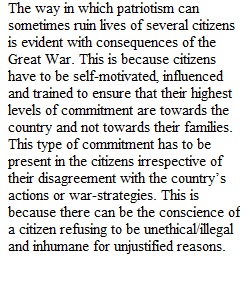


Q The introduction of gunpowder to the battlefields of Europe in the 15th century changed the nature of those on the battlefield. Knights chivalry and the alleged honor of close individual combat by champions on horseback would be replaced by persons considered expendable, and more appropriate to an anonymous death, authored anonymously, from a distance by gunfire or artillery. In the filmed lecture, Professor Weber notes that the generation that would fight 'The Great War' (WWI), products of the new public schools, were the most law abiding and patriotic ever seen. The new public schools had, with great care, taught their students to be proud of their nation and its peculiar/unique contribution to the progress of mankind, at the same time that it placed these students in a wider world in which, on various grounds, they could claim, unlike prior generations, a personal identity tied to that state's propagandized virtue and achievements -- affirmed in their 'school leaving certificate', which (replacing traditional religious coming of age ceremonies) vested boys with a state recognized/sponsored masculinity and adult status. The public schools generation that would fight on both sides of The Great War expected their war service to confirm their identity and masculinity, as well as the superiority of their nation state and its values; but the nature of the war experience, in the trenches and 'no man's land', denied opportunities for the kind of epic heroism portrayed on the plain beneath the walls of Troy in Homer's Iliad that they had all heard about in school (enhanced by publicity surrounding the excavations at Troy that had begun in the late 1880's) . While heroism existed, it did so more in service to fellow comrades in arms, rather than in victory. As Professor Winter will note, 80% of the deaths of The Great War were the result of artillery bombardment, and better than half of the war's victims would have unmarked graves. It has been said that, in war, only the victors have identity, but in The Great War there are no victors. For this week's 'Discussion', in the standard 500 words or less, consider the influence of public education in the creation of patriotic citizens in the era of the Fin de Siecle to The Great War, and the potential disillusionment of those, sent to the front, who came to the War more certain of themselves, and their place in the world, than they would be on their return home. Had the war experience coopted their identity, and render them anonymous canon-fodder that could find consolation only among the shared experience of their comrades?
View Related Questions